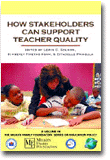
How Stakeholders Can Support Teacher Quality
Edited by:
Lewis C. Solmon, The Milken Family Foundation
Kimberly Firetag Agam, The Milken Family Foundation
Citadelle Priagula, The Milken Family Foundation
A volume in the series: The Milken Family Foundation Series on Education Policy. Editor(s): Lewis C. Solmon, The Milken Family Foundation.
Published 2007
How Stakeholders Can Support Teacher Quality compiles the proceedings from the Milken Family Foundation's National Education Conference (NEC), which took place in Washington, D.C., in May 2006. Each year, the NEC brings together practitioners, policymakers and private sector representatives to focus on critical issues in education. This work expands on the ideas and themes discussed in the first three volumes in this series on education policy: The first volume—Talented Teachers: The Essential Force for Improving Student Achievement—examined the importance of teacher quality. As the second in the series, Improving Student Achievement: Reforms that Work, introduced reform ideas and programs that positively impact both teacher quality and student work. The Challenges of School Reform: Implementation, Impact and Sustainability deepened these discussions by exploring the answers to questions regarding ensuring the longevity and sustained success of effective school reform.
How Stakeholders Can Support Teacher Quality examines the roles of teachers, the education sector, the government sector and the private sector in enhancing teacher quality. From the building level to the federal level, panelists sought to provide insight from their individual and collective endeavors to improve the quality of today’s teaching force to significantly impact the future.
CONTENTS
Introduction, Lewis C. Solmon, Kimberly Firetag Agam, and Citadelle Priagula. PART I: WHY TEACHER QUALITY. Why Teacher Quality? Lowell Milken. PART II: THE PRIVATE SECTOR AND TEACHER QUALITY. The Role of the Private Sector in Enhancing Teacher Quality, Lowell Milken, Russlynn Ali, Richard Lee Colvin, Jay P. Greene, Dan Katzir, Sandy Kress, Rod Paige. The Teacher Advancement Program, Tamara W. Schiff. PANEL CONTRIBUTIONS. Examining Philanthropy in K-12 Education: Lessons Learned from the Inside, Wendy Hassett and Dan Katzir. A Comprehensive Problem: The Disconnect Between Fantasy and Reality, Jay P. Greene. PART III: THE EDUCATION SECTOR AND TEACHER QUALITY. The Role of the Education Sector in Enhancing Teacher Quality, Lewis C. Solmon, Joan Baratz-Snowden, Thomas Carroll, Gary Stark, Paul G. Vallas, Susan Tave Zelman. PANEL CONTRIBUTIONS. The Theory of Devolution, Lewis C. Solmon. PART IV: THE GOVERNMENT AND TEACHER QUALITY. The Role of Government in Enhancing Teacher Quality, Stephen Goldsmith, Chester E. Finn, Jr., Henry Johnson, Nina S. Rees, Steven J. Robinson, Ted Sanders. Presentation by Congressman Ralph Regula. PANEL CONTRIBUTIONS. Teacher Can’t Teach, Chester E. Finn, Jr. Finding and Funding ’Cure’ for Ailing Schools, Nina S. Rees. PART V: TEACHERS AND TEACHER QUALITY. The Role of Teachers in Enhancing Teacher Quality and Improving Student Achievement, Lowell Milken, Doris Alvarez, Jennifer Couch, Amanda S. Mayeaux, Charles E. McAfee, Paula Tafoya Nunez, William Richey. PANEL CONTRIBUTIONS. Comprehensive Reform Can Offer Big Win for Teachers—and Students, Jennifer Couch. Why Do We Fear Excellence? Amanda S. Mayeaux. The Chemistry of Teacher Quality, William Richey.
-
Paperback978-1-59311-674-3
Web price: $45.04 (Reg. 52.99)
-
Hardcover978-1-59311-675-0
Web price: $80.74 (Reg. 94.99)
- eBook9781607526407

- EDU034000 - EDUCATION: EDUCATIONAL POLICY & REFORM: General
- EDU037000 - EDUCATION: Research
- EDU029000 - EDUCATION: TEACHING METHODS & MATERIALS: General
-
 (Re)Envisioning Social Studies Education Research
Current Epistemological and Methodological Expansions, Deconstructions, and Creations
(Re)Envisioning Social Studies Education Research
Current Epistemological and Methodological Expansions, Deconstructions, and Creations
-
 Cultivating Democratic Literacy Through the Arts
Guiding Preservice Teachers Towards Innovative Learning Spaces in ELA Classrooms
Cultivating Democratic Literacy Through the Arts
Guiding Preservice Teachers Towards Innovative Learning Spaces in ELA Classrooms
-
 Improving Student Achievement
Reforms that Work
Improving Student Achievement
Reforms that Work
-
 Qualitative Research With Diverse and Underserved Communities
Qualitative Research With Diverse and Underserved Communities
-
 Reflections on People, Policy, and Practices in Curriculum History
Reflections on People, Policy, and Practices in Curriculum History
-
 Talented Teachers
The Essential Force for Improving Student Acheivement
Talented Teachers
The Essential Force for Improving Student Acheivement
-
 The Challenge of School Reform
Implementation, Impact, and Sustainability
The Challenge of School Reform
Implementation, Impact, and Sustainability

